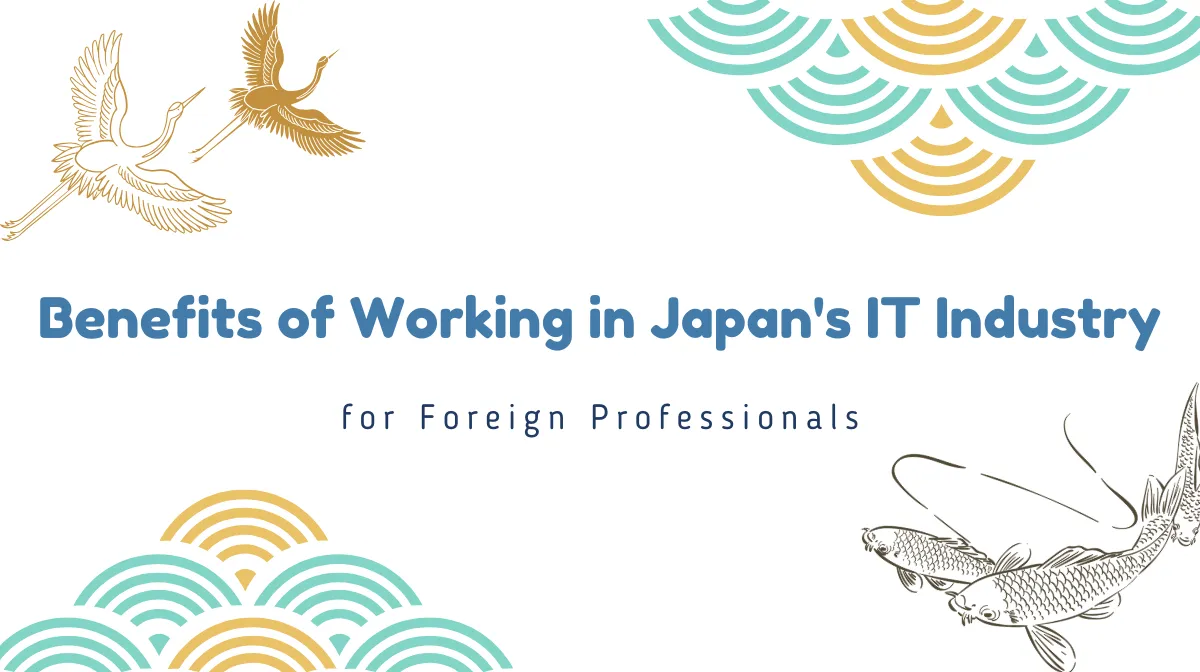Japan boasts one of the world’s top IT markets, yet it’s projected to face a shortage of up to 790,000 engineers by 2030. This situation presents excellent career opportunities for foreign engineers.
This article thoroughly explains the current state of Japan’s software engineering market and concrete steps for foreign talent to succeed, including high-income specialized fields and strategies for success in Japanese companies.
- Japan’s severe tech talent shortage creates opportunities for foreign engineers.
- High-demand skills include AI, cloud, and cybersecurity expertise.
- Success requires both technical abilities and cultural adaptation.
1. Current State of Japan’s Software Engineering Market and Foreign Recruitment Reality

Japan’s IT engineer market is now at a major turning point.
As the talent shortage deepens, expectations for foreign engineers are rising, making it important to view this market from a global perspective.
Japan’s IT Talent Shortage and Expectations for Foreign Engineers
Japan’s IT engineer population currently stands at “approximately 1.44 million.” While this may seem like a large number, compared to Northern European regions and the United States, the proportion of IT technicians in Japan is low.
In other words, “there is still significant room to increase the proportion of IT technicians” in the current situation.
Even more serious is that according to Ministry of Economy, Trade and Industry predictions, Japan’s IT talent demand is expected to increase from 1.09 million in 2018 to 1.64 million by 2030, but supply isn’t keeping up.
At the current rate, it’s predicted that between 400,000 and 800,000 IT professionals will be lacking by 2030.
The main causes of this shortage include…
- Increased demand due to DX (Digital Transformation) acceleration among large corporations and government agencies
- The anticipated mass retirement of engineers who entered the workforce during the internet’s early days (early 1990s) over the next decade
Against this backdrop, Japanese companies are placing high expectations on foreign engineers.
Particularly in highly specialized fields, there’s a strengthening movement to secure talented personnel regardless of nationality, creating a favorable market environment for foreign engineers.
Reference: Ministry of Economy, Trade and Industry: IT Human Resource Development Status(Japanese)
Global Comparison of Japan’s Engineer Market
The actual number of Japan’s IT professionals ranking “4th in the world” isn’t bad in itself.
According to Human Resocia’s survey, while falling behind the United States and China, Japan boasts more engineers than Germany and the United Kingdom.
Additionally, Japan’s IT market holds the world’s fourth-largest scale, and its technological level is highly evaluated internationally.
However, the point to note is “the ratio of IT technicians to population” Japan is clearly lower compared to Western countries, indicating there is still substantial room to increase IT technicians.
Japan’s software engineer market also has several characteristics.
◆Differences Between Japanese and Global IT Markets
- Culture emphasizing teamwork (valuing overall team achievements rather than individual results)
- Tendency to emphasize long-term employment relationships (lower job-change rate compared to Western countries)
- Strong commitment to quality and process (especially for financial and manufacturing industry systems)
- Emphasis on non-development tasks such as documentation and reporting
Regarding salary levels, Japanese software engineers’ annual income is moderate from an international perspective, but compensation for engineers in highly specialized fields or working with cutting-edge technologies is gradually trending upward.
Increasing Trend of Japanese Companies Actively Recruiting Foreign Engineers
In recent years, Japanese companies actively recruiting foreign engineers have increased.
The background includes an increase in companies expanding globally, acceleration of technological innovation, and above all, the serious IT talent shortage.
Environmental improvements for accepting foreign talent are progressing, especially centered around major IT companies.
◆Environmental Improvements for Foreign Engineer Recruitment by Major IT Companies
- Making English the official company language
- Enhanced technical visa acquisition support programs
- Introduction of cross-cultural understanding training programs
- Relaxation of geographical constraints due to remote work proliferation
- Housing support for foreigners
- Provision of Japanese language learning support, etc.
Recruitment events for foreign engineers and internship programs in partnership with overseas universities have also increased.
These trends indicate major changes in traditional Japanese corporate hiring practices and reflect the intensification of global talent acquisition competition.
2. Benefits and Challenges for Foreign Engineers Working in Japan

For foreign engineers considering careers in Japan, understanding this country’s specific benefits and challenges is extremely important.
By correctly recognizing opportunities in terms of market size and income, as well as challenges in language and legal aspects, you can lead to a more fruitful experience.
Abundant Employment Opportunities from the World’s 4th Largest IT Market
Japan’s IT market boasts the world’s 4th largest scale, forming a market of approximately 12 trillion yen.
This market size means a very attractive employment environment for foreign engineers.
Particularly due to the ongoing DX (Digital Transformation) promotion, demand for IT talent is increasing not only in traditional IT companies but also in various industries including manufacturing, finance, and retail.
The diversity of employment opportunities is also a characteristic of the Japanese market. Various types of companies from major IT companies and global corporations to growing startups and specialized small and medium-sized businesses are seeking engineers.
◆Fields Particularly Advantageous for Foreign Engineers
- Bilingual development teams in companies advancing global expansion
- Projects handling cutting-edge technologies (AI, machine learning, blockchain, etc.)
- Service development targeting foreign markets
- System development complying with international standards
- Projects collaborating with open source communities, etc.
In these fields, there are many cases where foreign engineers may actually have advantages over Japanese counterparts.
Development environments based on English communication are also increasing, with growing positions where one can excel without Japanese language skills.
Average Annual Income for Engineers in Japanese Companies
The average annual income for Japanese software engineers is generally around 5.8 million yen, but varies greatly depending on experience and specialization.
Particularly in highly specialized fields or engineers involved with cutting-edge technologies, it’s not uncommon to exceed 10 million yen in annual income.
As a trend in annual income by company type, large Japanese IT companies and foreign IT companies tend to have higher than average annual incomes.
Startup companies also tend to have average to slightly higher annual incomes, and many cases also offer stock option rights.
◆Status of Japanese Companies’ Salary Systems
Traditionally, there was a tendency toward seniority-based systems, but a shift to meritocracy is progressing in the IT industry. Particularly for highly specialized engineers or those with global experience, companies offering rewards beyond traditional frameworks are increasing. Additionally, as a benefit of working in Japan, additional allowances such as housing and commuting allowances are common in many companies.
Reference: Ministry of Health, Labour and Welfare: jobtag (IT Engineer)(Japanese)
Practical Approaches to Overcome Language Barriers
One of the biggest challenges for foreign engineers working in Japan is the language barrier.
However, various countermeasures and environmental improvements to reduce this barrier are progressing in recent years.
◆Strategies for Overcoming Language Barriers
- Choose companies that offer English-language work environments (foreign or global companies)
- Select positions that specialize in technical skills (such as coding as the main task)
- Utilize multilingual translation and communication tools
- Build communication strategies through bilingual colleagues
- Prioritize companies that provide Japanese language learning support
- Utilize information exchange and support in foreign communities, etc.
In practice, having Japanese language skills at a daily conversation level is sufficient to function in many workplaces.
Since many technical terms are derived from English, and actual coding work is basically in English, if you have high programming skills, language issues can be covered to some extent.
Conditions and Application Process for Technical Visas
To work in Japan, you need an appropriate visa.
The most common for engineers is the “Engineer/Specialist in Humanities/International Services” visa, but you should also consider the more favorable “Highly Skilled Professional” visa.
Basic Requirements for Engineer/Specialist in Humanities/International Services Visa
A degree in the field (university or technical college) or more than 10 years of practical experience, employment offer from a Japanese company, salary at a certain level or above (equal to or higher than Japanese counterparts), highly specialized job content, etc.
Particularly noteworthy is the “Highly Skilled Professional” visa. This visa is based on the government’s point system, with points awarded for elements such as educational background, work history, annual income, age, qualifications, etc., and can be obtained with 70 points or more.
Holders of the Highly Skilled Professional visa can receive various preferential measures, including longer periods of stay (up to 5 years).
Visa Application Process
The visa application process typically proceeds through the following steps.
- Receive an employment offer from a Japanese company
- The company applies for a Certificate of Eligibility at the Immigration Bureau
- Once the certificate is issued, apply for a visa at the Japanese embassy/consulate in your home country
- After entering Japan, register as a foreign resident at the municipal office of your residence area
Many companies provide support for visa applications, but it’s important to understand the conditions and required documents in advance.
Related Reading
The following article explains in detail the 9 benefits of working in Japan.
■日本でエンジニアとしてキャリアアップしたい方へ
海外エンジニア転職支援サービス『 Bloomtech Career 』にご相談ください。「英語OK」「ビザサポートあり」「高年収企業」など、外国人エンジニア向けの求人を多数掲載。専任のキャリアアドバイザーが、あなたのスキル・希望に合った最適な日本企業をご紹介します。
▼簡単・無料!30秒で登録完了!まずはお気軽にご連絡ください!
Bloomtech Careerに無料相談してみる
3. Skill Sets Japanese Companies Seek in Foreign Engineers

What Japanese companies expect from foreign engineers is not just technical skills. Understanding and adaptability to Japan’s unique corporate culture, as well as the added value of a global perspective, are also highly valued.
Understanding these complex skill sets will greatly expand your potential for success in Japanese companies.
The Reality of Communication Skills Valued More Than Technical Skills
When evaluating foreign engineers at Japanese companies, surprisingly, communication skills are often valued more than pure technical skills.
This is not simply a question of whether you can speak Japanese, but is recognized as an essential ability for smooth information sharing and business progression within the team.
In particular, specific communication skills are required in Japanese development environments.
Regular sharing of progress status and ensuring transparency, early reporting of problems and proposing countermeasures, smooth communication with team members, ability to accurately understand and appropriately respond to client requests, understanding of non-verbal communication (ability to “read the air”), etc.
Adaptability to Japan’s Unique “Ho-Ren-So” and Team Culture
An essential concept for understanding Japanese workplace culture is “Ho-Ren-So” (ほうれんそう). This is an abbreviation for “Reporting-Communication-Consultation” and is considered the basic principle of communication in Japanese companies.
Basic Elements of Ho-Ren-So
- Reporting
(regularly informing supervisors and concerned parties about work progress and results) - Communication
(sharing your action plans and information with concerned parties) - Consultation
(seeking opinions from concerned parties in advance about problems or matters where judgment is difficult)
The culture of “Ho-Ren-So” was born from the Japanese workplace environment that emphasizes team harmony and information sharing. For foreign engineers, the “consultation” part in particular may seem difficult.
This is because in Western business culture, individual judgment and responsibility are emphasized, so there may be concerns that consulting about trivial matters might be perceived as “lack of ability”
For Foreign Engineers to Adapt to Japanese Workplace Culture
It would be good to be mindful of points such as developing the habit of regularly sharing your progress, reporting and consulting early even for small problems, contributing constructively to team decisions, and demonstrating an attitude that prioritizes the success of the entire team over individual achievements.
International Perspective and Diversity Valued by Japanese Companies
As Japanese companies globalize, foreign engineers are also expected to bring “international perspectives” and “diversity” to the organization.
This includes not only knowledge about overseas markets but also introducing different problem-solving approaches and development methods to the team.
■Roles of Foreign Engineers That Tend to Be Highly Valued
- Knowledge of overseas market needs
- Information on global technology trends and latest methods
- Ability to connect with English-speaking resources and overseas communities
- Problem-solving approaches from diverse perspectives
- Contribution to the organization’s internationalization and diversity promotion
- Bridge between Japan and other countries
Many Japanese companies now recognize the value of diversity to promote innovation.
Foreign engineers are expected to play a catalyst role in bringing new perspectives and ways of thinking to the team, promoting creative problem-solving.
Related Reading
The following article explains in detail the 5 essential skills for success in Japanese IT companies.
4. Five Specialized Fields in High Demand for Foreign Engineers

There are specialized fields that are particularly in high demand in the Japanese market where foreign engineers can excel.
These fields are areas where technology trends and Japan-specific market needs intersect, and having expertise allows you to increase your market value.
Let’s look in detail at these fields where you can leverage global perspectives and specialized technology.
AI/Machine Learning Engineers Accelerating Global Expansion
AI/machine learning is one of the fields Japanese companies are most actively investing in, with demand for specialized talent far exceeding supply.
As the domestic talent shortage is serious, this presents an excellent entry opportunity for foreign engineers.
Japan’s AI market size exceeds 680 billion yen as of 2023 and is expanding at an annual growth rate of over 30%.
AI utilization is rapidly advancing particularly in manufacturing, medical, and financial fields, and engineers with international insights are valued in these areas.
◆Skills Required for AI/Machine Learning Engineers
- Programming languages (Python, R, Julia)
- Machine learning frameworks (TensorFlow, PyTorch, Keras)
- Data processing/analysis (SQL, Pandas, NumPy)
- Cloud AI services (GCP AI Platform, Azure ML, AWS SageMaker)
- Specialized knowledge in natural language processing/computer vision, etc.
The greatest attraction of this field is that English is effectively the standard language.
Since papers, library documentation, and community discussions are mostly conducted in English, you can compete with your expertise even with limited Japanese ability.
The income range is also attractive, with experienced professionals often earning 8 million yen or more (and even higher depending on experience and specialization).
Reference: Ministry of Internal Affairs and Communications
Cybersecurity Specialists Essential for Security Measures
The cybersecurity field is one of the areas facing the most serious talent shortage in Japan.
Japanese companies in particular are seeking specialists with international perspectives and the latest security knowledge to respond to global cyber threats.
In this regard, foreign engineers familiar with overseas security trends and the latest attack methods have a significant advantage.
◆Security Skills and Qualifications in Demand
In the security field, the value of personnel with specialized qualifications is particularly high, and engineers with international certifications have numerous positions available with annual incomes of 10 million yen or more.
Additionally, there is demand for security specialists across a wide range of industries, including financial institutions, critical infrastructure, and major IT companies, making it a field where long-term career paths can be easily envisioned.
Cloud Technicians Promoting DX in Japanese Companies
Due to DX (Digital Transformation) promotion led by the Ministry of Economy, Trade and Industry, cloud migration of Japanese companies is accelerating.
However, personnel familiar with cloud technologies are overwhelmingly scarce, with experts in major platforms such as AWS, Azure, and GCP in particularly high demand.
Many Japanese companies are latecomers to cloud utilization, making foreign engineers with knowledge of global success stories and advanced cloud architecture highly valuable.
◆Skills Required for Cloud Technicians
- Cloud platforms (AWS, Azure, GCP)
- Infrastructure as Code (IaC) (Terraform, CloudFormation)
- Container technologies (Docker, Kubernetes)
- CI/CD (Jenkins, GitHub Actions, GitLab CI)
- Microservice architecture
- Cloud-native development
The attraction of this field is that global technology standards apply and there are more English environment tasks than Japanese environment ones.
Engineers with international qualifications such as AWS Certified Solutions Architect or Google Cloud Certified Engineer can potentially earn annual incomes of 8 million yen or more.
As DX promotion is predicted to continue for more than 10 years, this can be considered a field where long-term career paths can be easily envisioned.
Reference: Ministry of Economy, Trade and Industry
Mobile Application Developers Who Can Easily Overcome Language Barriers
Mobile application development is a field where foreign engineers can enter with relatively low language barriers.
Development languages and frameworks are standardized internationally, and code readability is high, making communication within teams relatively easy.
Additionally, visual elements are important in user interface design and user experience creation, creating a characteristic where common understanding beyond language is easily formed.
◆Skills Required for Mobile App Developers
- iOS development (Swift, SwiftUI)
- Android development (Kotlin, Jetpack Compose)
- Cross-platform development (React Native, Flutter, Xamarin)
- Backend integration (RESTful API, GraphQL)
- Basic knowledge of UI/UX design
- Knowledge of App Store Optimization (ASO), etc.
Particularly noteworthy is that Japanese companies are strengthening app development with global market expansion in mind.
In such international projects, foreign engineers’ knowledge of their home country markets and international sensibilities become of great value.
The annual income for mobile app developers varies depending on experience and specialization, but for mid-level to senior-level professionals, it’s around 5.5-8 million yen, and for lead engineers or architects, it’s not uncommon to exceed 10 million yen.
Embedded System Developers Valued in Manufacturing Powerhouse Japan
As a world-class manufacturing powerhouse, Japan utilizes advanced embedded systems in various fields including automobiles, industrial equipment, and consumer electronics.
With the spread of IoT (Internet of Things), demand for embedded software developers is further increasing, and engineers with specialized knowledge are highly valued.
Particularly in the automotive industry, the development of electric vehicles (EVs) and connected cars is accelerating, dramatically increasing the importance of embedded software.
At the same time, domestic embedded system developers are aging, causing a rapid increase in demand for young foreign engineers.
Skills Required for Embedded System Developers
- Programming languages (C/C++, embedded C)
- Knowledge of Real-Time Operating Systems (RTOS)
- Understanding of microcontrollers (ARM, PIC, Arduino, etc.)
- Experience with low-level hardware control
- Knowledge of embedded Linux
- IoT protocols (MQTT, CoAP, OPC UA, etc.)
Embedded system development is an area where Japan’s tradition of “monozukuri” (manufacturing) intersects with modern technology, offering high long-term employment stability.
Annual income levels typically range from 6-9 million yen, but engineers with experience in advanced systems development for automobiles or industrial equipment can potentially earn even higher compensation.
■日本でエンジニアとしてキャリアアップしたい方へ
海外エンジニア転職支援サービス『 Bloomtech Career 』にご相談ください。「英語OK」「ビザサポートあり」「高年収企業」など、外国人エンジニア向けの求人を多数掲載。専任のキャリアアドバイザーが、あなたのスキル・希望に合った最適な日本企業をご紹介します。
▼簡単・無料!30秒で登録完了!まずはお気軽にご連絡ください!
Bloomtech Careerに無料相談してみる
5. Success Stories and Career Paths for Foreign Engineers in Japan

There are various paths for foreign engineers thriving in Japan.
Building a career in a large company, succeeding in a startup, or becoming independent as a freelancer—each has its own characteristics and benefits. Use actual success stories as a reference to find a career path that suits you.
Foreign Engineers Demonstrating Leadership in Major IT Companies
In Japanese major IT companies, there is an active movement to appoint foreign engineers to leadership positions to accelerate global expansion and promote innovation.
Foreign leaders who have achieved success possess not only technical expertise but also the ability to introduce global best practices while understanding Japanese corporate culture.
Common characteristics these leaders share include having deep understanding and respect for Japanese culture while maintaining a global perspective, having communication strategies for language barriers, possessing excellent technical skills and knowledge in specialized fields, and demonstrating long-term commitment to career building in Japan.
Career paths in large companies typically start from specialist positions, progress through team leader roles, and eventually can lead to executive positions such as board members or CTO.
However, for promotion in Japanese companies, certain levels of Japanese language ability (especially for positions requiring external communication), understanding of internal politics and decision-making processes, acquisition of business practices, and building long-term trust relationships are important factors.
Common Traits of Foreign CTOs Succeeding in Startup Companies
In Japan’s startup ecosystem, the presence of foreign CTOs and technical leaders is rapidly increasing.
They bring essential elements for the rapid growth of Japanese startups, such as access to cutting-edge technologies, introduction of international development methods, and promotion of global expansion.
Potential paths to aim for a CTO position in a startup:
- Gain experience as a senior engineer at Japanese startups or foreign tech companies
- Build technical expertise and achievements, and raise your profile in the Japanese startup community
- Participate from the early stages of a startup and lead the formulation and implementation of technical strategy
- Co-found your own startup or be invited as a CTO to a growing startup
Working styles in startups tend to be more favorable for foreign engineers compared to large companies, with quicker decision-making and often English-centered environments.
There’s also the possibility of high economic returns through stock options, etc.
Strategies for Freelancers to Acquire High-Paying Projects
Freelancing is an attractive career option, especially for foreign engineers with high specialization.
In Japan, there is high demand for freelance engineers with advanced skills, and by leveraging strengths unique to foreign engineers, it’s possible to acquire high-paying projects.
Strategies for acquiring high-paying projects
- Establish deep expertise in specific technology areas (AI, cloud, security, etc.)
- Specialize in fields where Japanese companies have high needs but few personnel
- Take on bridge-like roles leveraging bilingual abilities in English and Japanese
- Visualize achievements through portfolios and GitHub
- Build personal branding as an expert through technical blogs
- Establish reliable agents and networks
When working as a freelancer, using specialized agents is also an important strategy. They also provide support on the language front, which can lower barriers to project acquisition for foreign engineers.
While freelancing offers high freedom and income, there are also challenges to overcome, such as visa issues and contract instability.
Therefore, building long-term trust relationships with several clients or considering incorporation may also be effective options.
6. Points for Adapting to Japanese IT Company Culture

To succeed in Japanese IT companies, understanding and adapting to Japan’s unique corporate culture is extremely important, not just technical skills.
Understanding cultural differences and points for effective response will lead to smooth workplace adaptation and long-term success.
How to Navigate in a Workplace Environment That Values “Wa” (Harmony)
The concept of “Wa” (harmony) at the core of Japanese corporate culture might be initially difficult for foreign engineers to understand.
However, understanding and respecting this concept is the key to success in Japanese companies. “Wa” doesn’t simply mean “agreement of opinions” but signifies an attitude that values organizational harmony and smooth human relationships.
Points for navigating with “Wa” in mind
- Show an attitude of asking “What does everyone think?” before stating your opinion
- Use expressions like “Looking from another perspective…” rather than direct opposition
- Show an attitude that contributes to the entire team’s success rather than individual achievements
- Propose solutions simultaneously when raising issues
- Avoid criticizing supervisors or senior members in public
- Conduct “nemawashi” (prior consultation) with concerned parties before important decisions
- Participate in informal interaction opportunities such as company events, etc.
Resources for Understanding Japan’s Unique Corporate Culture
To adapt to Japanese corporate culture, it’s effective to utilize various resources. Particularly for foreign engineers, the following learning resources are helpful:
Japanese Corporate Culture Learning Resources
Books, online courses, YouTube, podcasts, government/NPO support, etc.
Effective point
Combine practical experience and learning. For example, use mentorship programs and foreign communities.
Reference: Immigration Services Agency of Japan: Foreign Resident Support
Characteristics of Japanese Companies Where You Can Work in English
Even if you’re concerned about Japanese language, companies where you can work in English environments are increasing in recent years.
Such companies have the following characteristics:
Characteristics of English-Environment Japanese Companies
- Adoption of English as the official corporate language
- International management and multinational team composition
- Internal documents and meetings basically in English
- Recruitment information provided in Japanese-English bilingual or English only
- HR systems that explicitly evaluate communication in English
- Frequent exchanges with overseas offices and opportunities to participate in international projects
- Corporate policies emphasizing diversity & inclusion, etc.
Industries and company types with many English environment employment opportunities tend to include Japanese offices of foreign tech companies, startups expanding globally, international game development studios, venture companies with foreign capital investment, and large companies with global research and development facilities.
Related Reading
The following article explains Japanese corporate work culture.
7. Concrete Steps and Preparation for Working in Japan

To realize employment in Japan, effective preparation and strategic approaches are essential.
By understanding and implementing specific steps such as how to find job information, how to utilize recruitment agents, obtaining valued qualifications, and market approaches according to Japanese language level, you can smoothly start your career in Japan.
Recruitment Information for Japanese Companies Accepting Overseas Applications and Application Tips
Applications to Japanese IT companies from overseas have become significantly easier in recent years due to the spread of online recruitment.
Through the following methods, you can access and apply to Japanese companies’ recruitment information while living overseas.
Japanese companies active in global recruitment often have English pages on their career sites, allowing direct applications.
In the Japanese IT industry, cases of being scouted by companies by looking at GitHub contributions or technical blogs are also increasing.
Important points when applying to Japanese companies from overseas
- Making a good impression by being able to respond to Japan-oriented resume formats (“shokumu keirekisho”)
- Emphasizing flexibility in meeting settings considering time zones
- Understanding and preparation for Japanese company-specific recruitment processes (multiple interviews, aptitude tests, etc.)
- Demonstrating seriousness and long-term commitment to working in Japan
- Specifically appealing interest in Japanese culture and Japanese companies, etc.
Recruitment Agents Open to Foreigners and How to Utilize Them
Utilizing recruitment agents is very effective, especially when accessing the Japanese job market from overseas.
By using agents specialized for foreign engineers, you can receive comprehensive support including language assistance, visa procedures, and explanation of cultural differences.
Tips for effectively utilizing agents
- Register with multiple agents simultaneously to access more job information
- Clearly communicate your preferences (industry, job type, salary, work location, etc.)
- Honestly convey your Japanese level and technical skills to promote appropriate matching
- Politely provide feedback on introduced positions
- Confirm details about visa support at an early stage, etc.
Since agents differ in their specialties in terms of industries and company sizes, it’s also important to choose agents that match your career goals.
8. Remote Work Trends in Japan and Opportunities for Foreign Engineers

Following the COVID-19 pandemic, Japanese companies’ attitudes toward remote work have changed significantly.
This opens a new window of opportunity for foreign engineers who want to participate in Japanese companies’ projects from outside Japan.
By gaining knowledge about the latest remote work situations and related legal and practical aspects, more flexible career choices become possible.
Remote Work Systems in Japanese Companies Continuing After COVID
The COVID-19 pandemic brought major transformation to Japanese companies’ work styles.
Japanese companies with traditionally strong face-to-face cultures were forced to introduce remote work due to the pandemic, and as a result, new work styles are becoming established in many companies.
This trend is especially prominent in the IT industry. Many major Japanese IT companies are continuing and expanding their remote work systems even after the pandemic.
However, there are differences in remote work implementation status depending on industry and company size among Japanese companies.
In many companies, rather than complete remote work, “hybrid work” is mainstream. This is a model combining office attendance 2-3 days per week with remote work on the remaining days.
However, companies permitting complete remote work are increasing for jobs with clear deliverables, creating a significant opportunity for foreign engineers.
Japanese IT Companies and Projects Accessible from Outside Japan
Among Japanese companies, there are also movements actively recruiting foreign engineers residing outside Japan.
Company types active in recruiting overseas engineers
- Startups advancing global expansion
- Companies with English as the official language
- Companies developing international products
- Major IT companies with global development teams
- Companies promoting open source projects
- SaaS companies with global customer bases
Innovations companies are implementing
Many adopt flexible work systems considering time differences (e.g., setting core time for meetings allowing 2-3 hours time difference for Asian regions), etc.
Projects particularly suitable for participation from overseas
- International expansion of in-house products (localization)
- New service development for global markets
- Contribution to open source projects
- Mobile application development
- AI/machine learning related research and development
- Cloud infrastructure construction/operation, etc.
Tax and Legal Considerations for Cross-Border Remote Work
When participating in Japanese companies’ projects from outside Japan, understanding tax and legal aspects is essential.
This knowledge is an important element for building stable, long-term relationships.
Tax considerations
- Basic principles (income tax is principally taxed in the “country of residence”)
- Avoidance of double taxation
- Withholding tax
- Tax obligations
- Consumption tax (treatment of consumption tax for international service provision is complex and varies by country), etc.
To simplify these tax issues, many foreign engineers choose methods such as
- Concluding a contract for services and operating as a sole proprietor or corporation in their home country
- Using international payroll services (such as Remote.com)
- Consulting with specialized tax advisors
Remote work with Japanese companies can potentially become an ideal option allowing you to gain work experience in Japan while maintaining your life in your home country.
If you’re considering moving to Japan in the future, a phased approach starting with remote work to build relationships and learn Japanese can also be effective.
9. Japan’s Software Engineer Shortage Presents a Great Opportunity for Foreign Talent
While Japan’s IT talent shortage continues to worsen, this presents a great opportunity for foreign engineers.
By combining highly specialized skills with adaptability to Japanese culture, you can achieve stable high income and a fulfilling career.
The key to success in the Japanese market is building a career from a long-term perspective, advancing adaptation to technology trends and improvement of Japanese language ability in parallel.





















